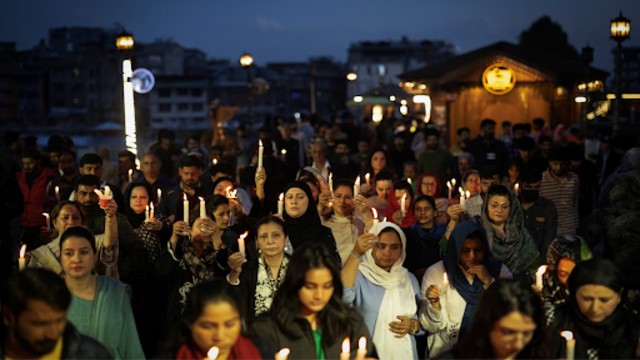
People in Srinagar gathered with candles on Wednesday to show their sadness and anger over the recent attack. REUTERS
India took strong diplomatic steps against Pakistan after a deadly attack in Kashmir. The government summoned Pakistan’s top diplomat in New Delhi just one day after 26 civilians were killed in a brutal shooting in Pahalgam, Kashmir. It was one of the deadliest attacks on civilians in India in over 20 years.
India’s foreign secretary, Vikram Misri, said the attack had links across the border. He announced several strict actions in response. First, India will stop following the Indus Waters Treaty, which has been in place since 1960. This agreement divided river water use between the two nations. It had survived past wars but will now be put on hold.
Second, India will shut the Attari-Wagah border crossing, the only land route between the countries. All travel through this crossing must stop, except for people who already crossed and are returning before May 1, 2025.
Third, Indian defence advisers in Pakistan will return home. Pakistan’s defence staff in India must leave within a week. India will also reduce its staff at the Islamabad embassy from 55 to 30.
Misri confirmed that Pakistani nationals can no longer travel to India under the SAARC Visa Exemption Scheme. Any visas already issued under this program are cancelled. Pakistani visitors in India on this visa now have 48 hours to leave the country.
India’s Prime Minister Narendra Modi held an all-party meeting with opposition leaders to brief them about the government's action plan. The goal was to ensure unity in this serious situation.
On the other side, Pakistan’s Prime Minister Shehbaz Sharif planned a national security meeting. He wanted to discuss Pakistan’s response with his team. Pakistan's foreign minister confirmed this in a post online.
The Indus Waters Treaty was once seen as a symbol of cooperation between India and Pakistan. The World Bank helped mediate it. It allowed both countries to share river waters fairly. However, this recent attack caused India to rethink that agreement.
Diplomatic ties between the two countries were already tense. Pakistan had removed India’s ambassador and never sent its own replacement after India changed the status of Jammu and Kashmir in 2019. The move had angered Pakistan and further strained the relationship.
This week’s attack is a big blow to India’s recent efforts in the region. The government had said removing Kashmir’s special status in 2019 would bring peace and growth. But the killing of 26 people raised doubts about the situation’s progress.
India’s latest actions show that the government sees this as more than just a local incident. By cutting off water talks, border travel, and diplomatic ties, India is sending a strong message. It expects accountability and change from Pakistan.















